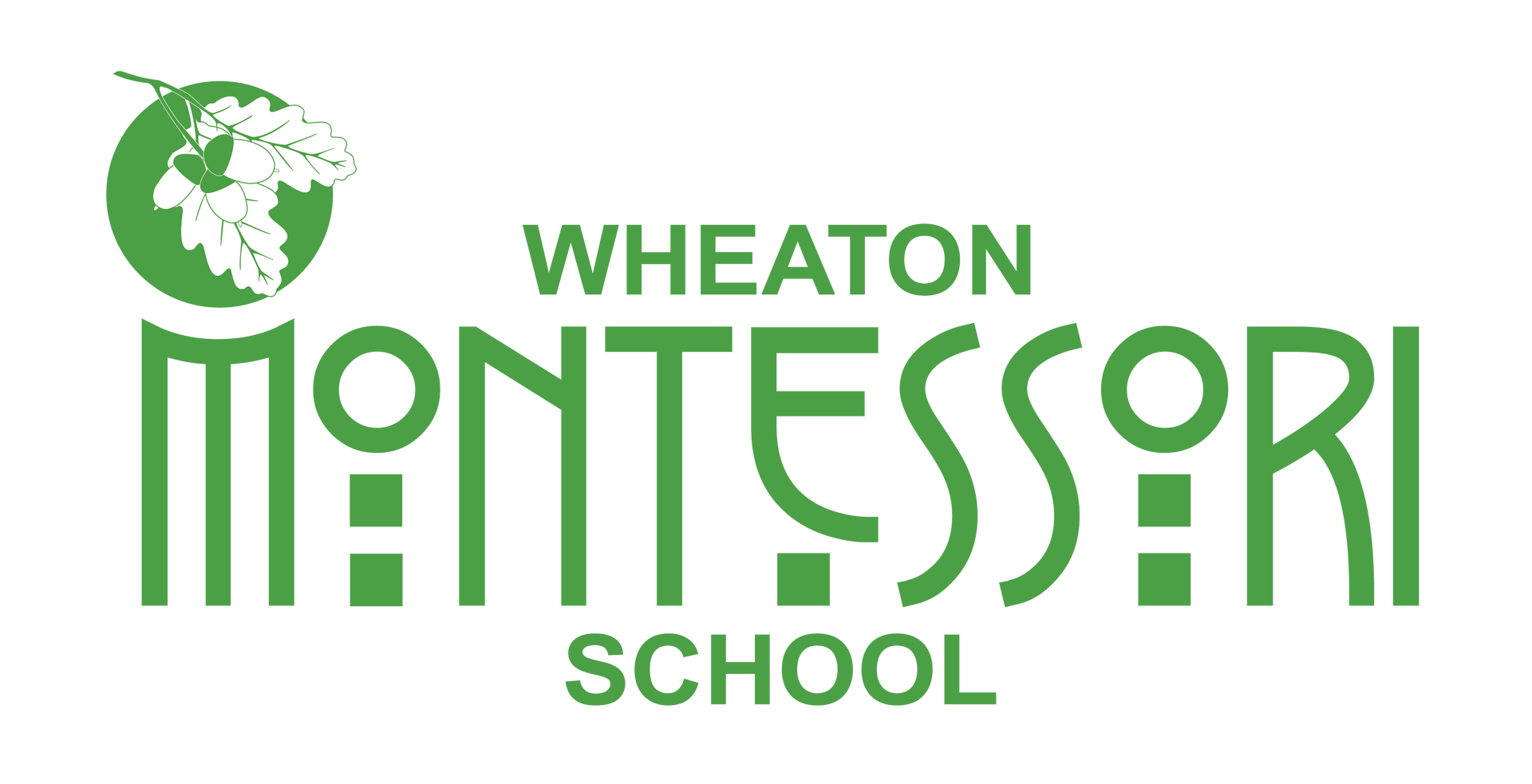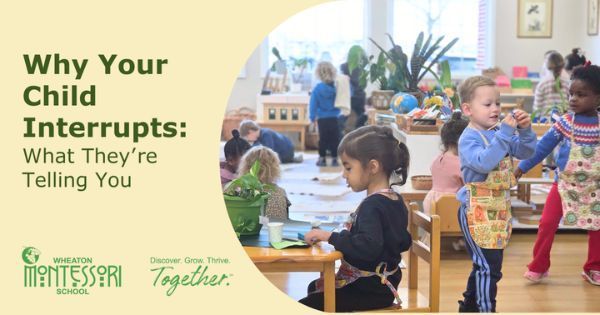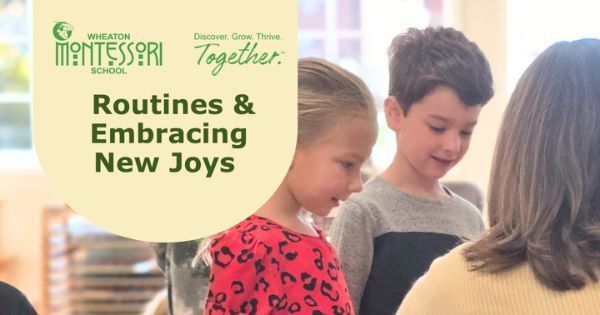
The fourth plane of development (ages 18-24) aims to cultivate individuals who prioritize both personal success and the welfare of humanity. Young adults, having benefited from supportive environments in earlier stages, emerge with a strong social conscience and a desire to address societal issues. This ideal aligns with the Montessori vision of a world where individuals contribute meaningfully to the world. The fourth plane emphasizes self-realization and societal engagement, encouraging young adults to focus on broader responsibilities beyond personal goals, ultimately fostering a society capable of enhancing humanity's well-being.
Wheaton Montessori School provides a personalized, engaging, and nurturing education, allowing children to discover, grow, and thrive in their unique potential within a respectful and inclusive environment. Our Primary Program students who continue to our Elementary Program, and the Adolescent Community through 9th grade, transfer into high school as sophomores, often enrolling in honors and/or junior-level courses. The most common feedback we receive about our graduates is that they stand out to their high school and college instructors. They demonstrate confidence when interacting with teachers, take responsibility for their learning, and have a clear understanding of what is required to succeed in their classes.
Read on for the full details or skip to the bottom to schedule a visit to your child’s class.
Full Blog Post
This blog is the final post of the four-part series exploring the stages of development: Infancy (birth to age 6), Childhood (ages 6 to 12), Adolescence (ages 12 to 18), and Maturity (ages 18 to 24). Montessori pedagogy calls for a big-picture perspective that incorporates the fundamental principles of growth at each developmental stage, focusing on how we can effectively nurture each young person throughout their growth. This blog covers the Maturity stage of development and how Wheaton Montessori School paves the way for young people to step into the world as confident, independent, well-adjusted, happy, and incredible adults.
A Path Toward Maturity
The fourth plane spans from 18 to 24 years of age, and Dr. Montessori refers to it as Maturity. It signals the culmination of psychological and physical growth and paves the way for young people to step into the world as capable adults who know their wants and needs and are equipped to make positive contributions to society.
Characteristics of the Fourth Plane
This stage represents a time when individuals reach the height of their development and begin to assume their role in society. Unlike the earlier planes, the psychological changes during this period are more internal, and the focus shifts to understanding oneself and their independent choices while being aware of the world beyond one’s immediate needs. In The Four Planes of Education, Dr. Montessori writes, “The individual should be the man who knows how to make his own choice of action having passed to perfection the preceding phases. He should be as a live spark and aware of the open gate to the potentialities of prospective human life and of his own possibilities and responsibilities” (p. 15).
In this stage, individuals are learning to engage with the world beyond their ego. The question that arises is not “Who am I?” but “What can I do?” This shift from self-centeredness to a broader, more collective view of life signifies the maturity that defines the fourth plane.
Conquest of Independence
One of the key aspects of the fourth plane is the conquest of independence, particularly economic independence. This phase marks a time when individuals strive to become self-sufficient within the larger society.
This is a period when a personal mission begins to take shape. Young adults start to solidify their goals, whether academic, professional, or personal and work toward them with a growing sense of purpose. Dr. Montessori believed that achieving economic independence is crucial and fosters a sense of autonomy and responsibility.
Observable Examples of Development
By the fourth plane, physical development is largely complete. The dramatic growth spurts of the previous stages have slowed, and young adults now have full mastery over their bodies. Health is typically stable, and there is an overall sense of well-being.
Much like the second plane, the fourth plane is also conducive to intellectual pursuits, particularly those that lead to specialization in areas essential for a future career. This is when our young adults are honing skills that will serve them in the professional world, whether through higher education, apprenticeships, or other forms of specialized learning.
The fourth plane is also a time when individuals, having developed a solid understanding of themselves, are ready to take on more significant intellectual and social responsibilities. This is when they truly start asking the big questions, such as, “How can I contribute to the world?” It is at this stage that young adults embark on the exploration of their "cosmic task," a concept Montessori introduced in the second plane, which refers to the idea that every individual has a unique role to play in the larger story of humanity.
The Role of the Supportive Environment
With significant internal growth happening during the fourth plane, the role of the external environment remains crucial. A supportive environment during the preceding stages can have a profound effect on how individuals move through this stage. If our young adults have been nurtured in an environment that promotes autonomy, responsibility, and respect for their capacity to make choices, they are more likely to enter adulthood with the skills and mindset necessary to thrive in society.
To prepare for their careers during this time, many young adults pursue higher education, either through university studies or vocational training. Alternatively, they may enter the workforce, beginning to take on professional roles that contribute to society. This is also a time when many young adults leave the family home and start families of their own, further solidifying their place in the world as independent adults.
An Enlightened Society
Imagine a world in which all young adults, having been guided through the previous developmental stages, emerge from the fourth plane ready to play their roles in society—not only as self-sufficient individuals but as enlightened members of a larger human community. This vision encapsulates the Montessori ideal: a world where everyone has the potential to contribute meaningfully to the advancement of humanity.
The fourth plane of development aims to cultivate individuals who prioritize both personal success and the welfare of humanity. Young adults, having benefited from supportive environments in earlier stages, emerge with a strong social conscience and a desire to address societal issues. This ideal aligns with the Montessori vision of a world where individuals contribute meaningfully to the world. The fourth plane emphasizes self-realization and societal engagement, encouraging young adults to focus on broader responsibilities beyond personal goals, ultimately fostering a society capable of enhancing humanity's well-being.
Wheaton Montessori School provides a personalized, engaging, and nurturing education, allowing children to discover, grow, and thrive in their unique potential within a respectful and inclusive environment. Our Primary Program students who continue to our Elementary Program, and the Adolescent Community through 9th grade, transfer into high school as sophomores, often enrolling in honors and/or junior-level courses. The most common feedback we receive about our graduates is that they stand out to their high school and college instructors. They demonstrate confidence when interacting with teachers, take responsibility for their learning, and have a clear understanding of what is required to succeed in their classes.
Current families are encouraged to schedule their classroom observations and see how we support development during early stages and foster the growth of capable and adaptable young people who enter the phase of Maturity as confident young adults.
Adolescent Community Classroom Observation
Ms. Searcy’s Upper Elementary Classroom Observation
Mrs. Fortun’s Lower Elementary Classroom Observation
Mrs. Mayhugh’s Lower Elementary Classroom Observation
Mrs. Berdick’s Primary Classroom Observation
Mrs. McClelland's Primary Classroom Observation
Ms. Chiste’s Primary Classroom Observation
Mrs. Rogers’s Primary Classroom Observation
Prospective families with toddlers and children under 4 are encouraged to sign up for a school tour to explore the advantages of our Primary Program, which lays the essential foundation for our Elementary and Adolescent Community Programs.
Our waitlist for kindergarten-9th grade for Fall 2025 is currently closed. Please check back in April to see if the waitlist is open then. Individual tours will only be offered for kindergarten through 9th grade if the waitlist is open. New student transfers to our elementary and adolescent programs must be from a Montessori school.


